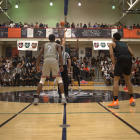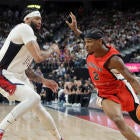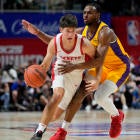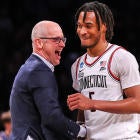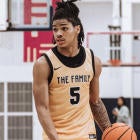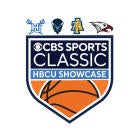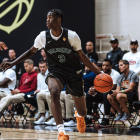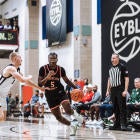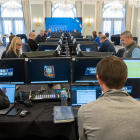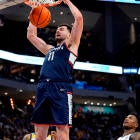LAS VEGAS -- College basketball recruiting as we know it will soon look very different if significant new NCAA rule changes are approved as expected.
After possible changes to recruiting rules were originally rebuked by coaches in recent weeks, significant revamps to the NCAA rulebook and calendar are on the precipice of becoming official, with the traditional/coveted July live period looking decidedly different starting in 2019.
A high-level source involved in the process told CBS Sports that, in addition to July undergoing overhaul, major changes could be on the way for April -- and June too, which for decades has not been a month associated with on-the-road recruitment. With the 2018 July live period over, the newly updated proposals detailed below are now highly anticipated to pass across the board.
In July, coaches will be moved from from three weekends to one when it comes to attending sanctioned, non-scholastic (so-called "AAU") events. The earliest five-day July evaluation period will remain in place; coaches will still be able to attend Nike's Peach Jam and other non-scholastic tournaments in that window. The month itself is shrinking from three recruiting weekends to two, with the second featuring camp-style events that will be coordinated by the NCAA, USA Basketball, the NBA and the NBA Players Association.
It's the first time those four major organizations have formally come together to organize a national basketball event.
According to the proposal that's expected to pass on Aug. 8, the camps will include approximately 1,100 high school seniors, potentially as many as 1,000 juniors and significantly lower number of elite sophomores. High school freshmen will not be invited.
Prior to July, though, coaches will get a bonus recruiting opportunity in April. For the past decade-plus, coaches have evaluated and recruited prospects on the road once or twice in April (depending on how the calendar falls). April's evaluation calendar will remain the same, but if the proposal passes as anticipated, per the source, in-home visits for coaches will be allowed after on-the-road eval periods conclude. As the rule stands now, home visits for recruits are not allowed until a prospect completes their scholastic junior year of high school and, typically, don't take place until the fall of a prospect's senior year.
As for June, coaches will be allowed to go on the road for two three-day periods at the end of the month. The events will be scholastic-oriented (meaning apparel companies cannot be involved), with the focus on rekindling relationships and connections between college and high school coaches.
All amendments on the table are intended to take effect in 2019. Tweaks to forthcoming legislation could be implemented in a year's time, or perhaps in 2020, after the NCAA and its membership monitor how the changes take shape in a markedly different era for college basketball.
Why, and how, did we get here? The FBI served as the sparkplug, but this movement was started by NCAA president Mark Emmert, who catalyzed and demanded a change to the overall system in college hoops soon after the FBI's bombshell case went public last September.
College basketball's offseason spins -- and is routinely populated by stories -- in good part because of how the sport is recruited. But in the aftershock of the FBI's unprecedented investigation, which led to multiple federal charges against 10 people, Emmert vowed for swift and major reform. Thus: the Commission on College Basketball, which was led by Condoleezza Rice. In the Commission's report from April it called for the assembly of committees (labeled by the NCAA as "working groups") that would gather information and feedback to ensure Emmert's directive was met.
The recruiting model (which was believed by Emmert and others in the NCAA to be partly if not largely responsible for the FBI's probe) was destined to get a redesign.
Over the past two months, feedback was collected and passed along to all conference representatives who are on the Division I Council. All final reviews and information on this topic were sent to the Division I Council on Monday, according to a source. The Council will meet on a conference call Tuesday afternoon to finalize the process for formal proposals that will fundamentally change how and when college coaches can recruit. On Wednesday the Division I Council will send its official action points to the Board of Directors (which oversees all matters in Division I) and the Board of Governors (which oversees NCAA matters at all levels). Both bodies are expected to vote the proposals into legislation on Aug. 7 and 8 in Indianapolis.
These will serve as the first official rule changes to college basketball in the aftermath of the FBI's investigation.
Representatives from a number of working groups were at apparel company events in July to examine how non-scholastic basketball operates. Administrators and athletic directors who served on these working groups took into account response from coaches, event organizers and media members.
"The setup seems to be very functional," Oklahoma athletic director Joe Castiglione told CBS Sports about Nike's annual Peach Jam.
Multiple sources told CBS Sports that feedback received by Castiglione and others led to tweaks to the overall proposal, which has been in development since shortly after the Rice Commission released its report.
Wondering how your favorite team will recruit players going forward? If all things pass, here are the most pertinent month-by-month details in how college basketball's recruiting model will be rebuilt.
How recruiting in April would change
- While July's calendar shift will dictate a lot of reaction and discussion, coaches getting the opportunity to visit prospects in their home cities/towns will add an interesting calculus to the recruiting calendar. Coaches are allowed 130 days on the road to recruit; that number isn't changing. So if a staff opts to use home visits in April, it will sacrifice dates elsewhere.
- Coaches taking advantage of April home visits will also be encouraged to visit the high schools of the prospects they're recruiting in the four business days that follow certified event weekends. Those four days will normally be a Monday-through-Thursday.
- The April calendar is dictated by which weekend the Final Four falls on, when Easter hits and when SAT/ACT testing dates are; live periods are not sanctioned alongside standardized testing weekends. Because of the way the 2019 calendar falls (Easter's not until April 21), the April live period will only include one weekend next year. It will include two in 2020.
How recruiting in May would look
- May is a "quiet" period and will remain as is. There are no recruiting events, but high schoolers can officially or unofficially visit for most of the month. Coaches are prohibited from recruiting on the road.
- The working groups tasked with recruiting regulations considered adding one live period in May but ultimately opted out, citing the National Association of Basketball Coaches' (NABC) recommendation against it.
In regard to many of the forthcoming rule changes, sources told CBS Sports that the NABC was the driving entity in recommending what should change and how. The Rice Commission and working groups didn't put forth directives independent of counsel from the NABC. The irony in this is: dozens of coaches who were questioned on background by CBS Sports in July cited discouragement and frustration with how the NABC operates. Nonetheless, certain prominent coaches who were vocal pushed forth ideas that ultimately look set to pass.
How recruiting in June would look
- The final two weekends of June will now include scholastic-sponsored events that will begin Friday at 5 p.m. local and conclude early Sunday evening. The events will be put on in conjunction with state high school associations and/or basketball coaches' associations in those states. They will be akin to traditional basketball jamborees or team camps. The details and locations of these camps are still to be determined.
- The camps will have no apparel-company presence. This will be high schoolers being evaluated while playing with high school teammates and others from their general area.
- It's the first time in a very long time that June will be a travel month for recruiting for college basketball coaches. Additionally, this window was put forth to allow coaches to have approximately the same amount of days available to recruit on the road in the summer. Instead of just 15 days in July, the recruiting will break up between June and July.
"To accommodate opportunities in June, July had to be sacrificed," a source said. "Coaches don't want it (more travel days) and their bosses don't want them out more than they are now."
How recruiting in July would look
- The most common specific lament I heard from coaches in July? Just don't take away Peach Jam. The NCAA listened. Nike's Peach Jam -- and other apparel-company events -- will go on with coaches in attendance but only in the first five-day window. In 2019, this would be July 11-15.
- The NCAA worked with apparel companies to come to a compromise on this. Adidas, Nike and Under Armour (and, if it opts to get into this world, Puma) are aware of the drastic change to the recruiting calendar that's coming. The onus is on those companies to decide if they want to adjust the timetable for their biggest youth basketball events. If they do, it could mean that Nike, Adidas and Under Armour all have their biggest championship events concluding simultaneously, which hasn't been the case up to now.
- The second period in July will still be an option for apparel companies and others to hold sanctioned events, but if the legislation passes as expected, it will be a dead travel period for coaches. Those games would be played without a single NCAA school logo appearing in the bleachers or along the sideline. The drop-off from the first weekend to the second is set to be drastic. In speaking with coaches throughout July, this idea has some backing. It allows coaches to be on campus with their players as they attend summer school.
- Bye-bye, Vegas? It remains to be seen if Adidas and/or Under Armour opt to alter their tournament calendars and go to Las Vegas to compete with Peach Jam in North Augusta, S.C. If they don't, then the era of coaches attending so many non-scholastic events in so many gyms and driving all around Vegas in order to evaluate and recruit is over.
- The certification process for April and July events will become more rigorous. The NCAA is seeking more transparency from apparel companies and small-party organizations alike. Any event operator that wants to run a tournament-style/non-scholastic event will have to hand over financial documents and provide particular event details for NCAA approval.
- The final recruiting "weekend" of July will either be five or six days long. It will be a nationwide camp that is regionalized in order to accommodate so many players. Locations and format as of now are not set and will probably not be finalized before the proposal goes to vote on Aug. 7 and/or 8 because it's a collaborative effort between the four major basketball partners involved (NCAA, USA Basketball, NBA, NBA Players Association).
The method for players who will be selected for the July camp is not yet determined. Every Division I coaching staff will be asked to nominate players -- and that should be a main source of the invitee list -- but other factors could come into play, like if a certain player was underrepresented on coaches' lists but had been previously voted to all-state or all-region recognition. The number of nominations will determine the order in which high school players get invited.
There will be approximately 1,100 seniors who get invited to the late-July camp because, according to the NCAA's findings, there are roughly 1,100 players who earn Division I scholarships annually. (That number includes service academy rosters, even though those institutions don't award scholarships.) While the goal is to get 1,100 seniors and close to 2,000 total high school players, powers-that-be are still aware that the first year will make for an interesting test phase.
The timeline for this has been forceful in order to meet the Aug. 8 deadline. Last week in Las Vegas, as USA Basketball held its minicamp with some of the biggest stars in the NBA taking part, more details were sorted out among the major players in each of the four big basketball organizations. Neither Emmert or NBA commissioner Adam Silver were in attendance, nor were they ever expected to be involved in those meetings, a source said. More in-person and conference-call meetings are on the docket in the months to come. The end-of-July camp initiative bears weighty logistical and financial burdens.
The Rice Commission, the NCAA and its working groups have taken feedback from all quarters in an effort to fix college hoops for the better. Coaches, however, remain skeptical. Recruits, who've had no say in this, will be forced to play along. Nevertheless, at this point, the likelihood of college basketball recruiting ever going back to having three live weekends with non-scholastic tournaments that coaches can attend in July is extremely low. From the NCAA's perspective, confidence is high that the new blueprint can and will work because of the influence and involvement of USA Basketball, the NBA and its players association.
And in a week, well before any of the accused go to trial, the FBI's massive case on college basketball will officially trigger a legislative reconstruction on how the sport operates from the grassroots up.








